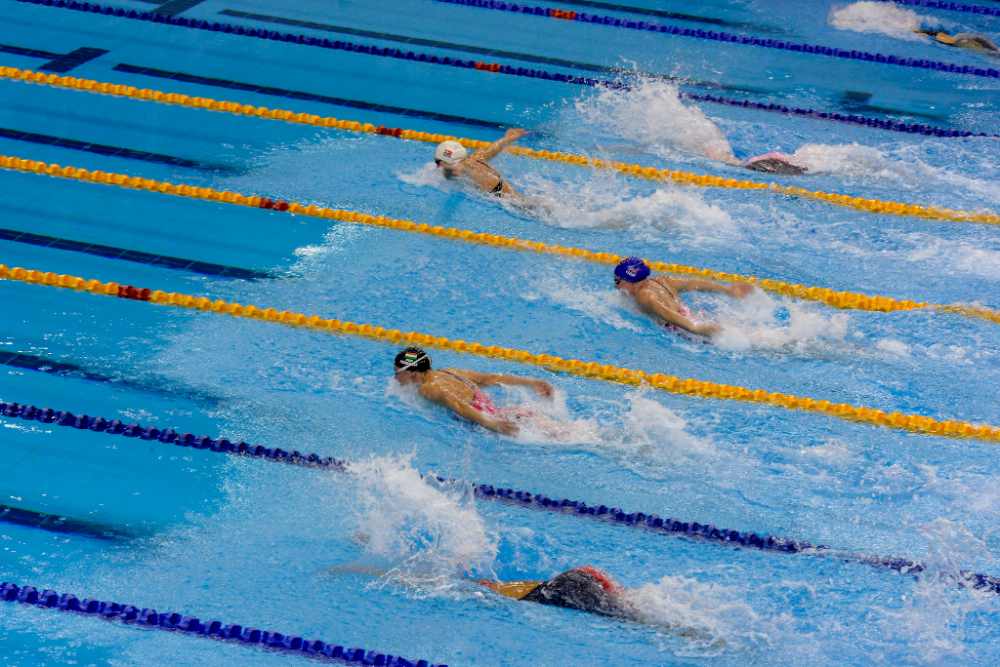Swim goggles protect your eyes and help you swim better. Here are the benefits of wearing swim goggles at the pool.
Swimming is one of the best sports and activities you can do for both your physical and mental health.
Regardless of whether you are aiming at attending the next summer Olympics or you simply just like taking a break from social media and your smartphone for an hour to stare at a black tiled line, swimming is awesome.
And one of the essential pieces of swim equipment for tackling today’s swim practice is a set of swim goggles.
While you could go au naturel like the swimmers of the past, there are a lot of serious benefits to strapping on a pair of trusty swim goggles when you hit the water.
Some of the benefits of goggles are obvious (seeing stuff) but other reasons to wear swim goggles might be a little less obvious.
If you’re still sitting on the side of the pool about whether or not you should wear them, check out some of the best reasons to strap on a pair of swim goggles below.
Safety first!
The primary function of swim goggles is to improve underwater visibility.
Some of the ways this underwater vision comes in handy:
🏊 Judging distance to the wall. Crystal-clear vision means we can see that bulkhead or pool wall coming at us, even in the most dimly lit of swim pools. This helps you time your flip-turns properly and touch the wall at the end of your race on a full stroke.
🏊 Seeing other swimmers. Going to a swim meet and getting for warm-up can feel like a full contact sport. Hundreds of swimmers packed into the pool, the water bubbling with arms. Swim goggles allow you to keep an eye on other swimmers to avoid collisions.
While you can try and acclimatize your naked eyes to the water, we aren’t built to do so. Human eyes aren’t designed to see well under the surface as water reduces the power of the eye to focus. The scattering of light also reduces contrast, making it harder to properly assess depth and shapes.
Focus on technique.
Swim goggles help you swim with better technique. Is that an outrageous statement?
Maybe.
But because you can see properly under the water, you can see your hand placement, the path of the pull under the water, how close you are to the surface on a backstroke breakout, and so on.
So much of your stroke technique depends on being able to process the visual cues of the environment around you.
Extend your swim workouts.
Every swimmer, at some point, experiences the struggle of having their eyes become bloodshot and supremely itchy while at the pool.
That awful itchiness and bloodshot eyes that comes from your eyes interact with chloramines (it’s not chlorine specifically that causes your eyes to itch and burn—it’s the chloramines, a byproduct of chlorine interacting with organic matter like sweat and pee) can stop a great workout dead in its tracks.
After all, what is gonna drain your motivation faster than your eyes feeling like they are on fire and super itchy? Doesn’t make me want to keep swimming, that’s for sure.
Swim goggles, by reducing and eliminating the red eyes will keep you in the water longer.
Purists, the kind who walked to school uphill, five miles in the snow—both ways!—will say that you don’t need swim goggles.
I would argue that I want my eyes to be healthy more than I need to be a tough guy 😉.
(If you are wearing swim goggles and your eyes are still getting itchy and red, here’s a guide on how to stop your swim goggles from leaking.)
Protect your eyes from the sun and glare
There are few things in the world better than swimming laps in an outdoor pool. Some might say it’s my happy place. The sparkling water, a sunny day, and a lane to myself is a recipe for all the ills in my life.
But on these occasions when I find myself out on the water, having a pair of swim goggles with a dark tint—or better, polarized or mirrored lens—is a gamechanger.
Properly tinted swim goggles can make swimming outdoors way more enjoyable as you won’t find yourself squinting like you are trying to read the page of a dictionary from a distance of 25-yards.
For outdoor swimming, at the least look for a darkly tinted lens. A polarized lens is a great all-weather lens that is built to reduce the glare from water in the outdoors.
Mirrored lens also does an exceptional job or reflecting light and competitive swimmers love them because of the perceived psychological advantage that comes with competitors not being able to see their eyes on race day.
Prescription options!
Lastly, swim goggles come with the option of corrective lenses. Which is great news for the estimated 45 million wearers of contact lens in the United States1 (plus the countless others who wear corrective glasses).
While optical swim goggles were a little slow to come to market, swim companies have finally caught up, producing a decent number of very reasonably priced swim goggles with optical lenses.
Trying to see under the water is hard enough, no need to compound the issue for those who have myopia or other vision-related issues.
In Conclusion
Swimming goggles, as you are hopefully starting to see by now, provide a heap of benefits for you in terms of motivation, safety and health.
At the end of the day (or rather, at the end of your swim practice), they are a tool to protect your eyes from yucky pool chemicals, help you see everything and everyone under the water, and can even help you swim with better technique.
The next time you head down to the pool, grab a pair of swim goggles and make the most of your time in the water.

Beau Cormier is a former NCAA I swimmer, US Open National finalist, and swim nerd. When not swimming or working for a data company, you can find him running the trails of the Pacific Northwest with his wife and dogs.
